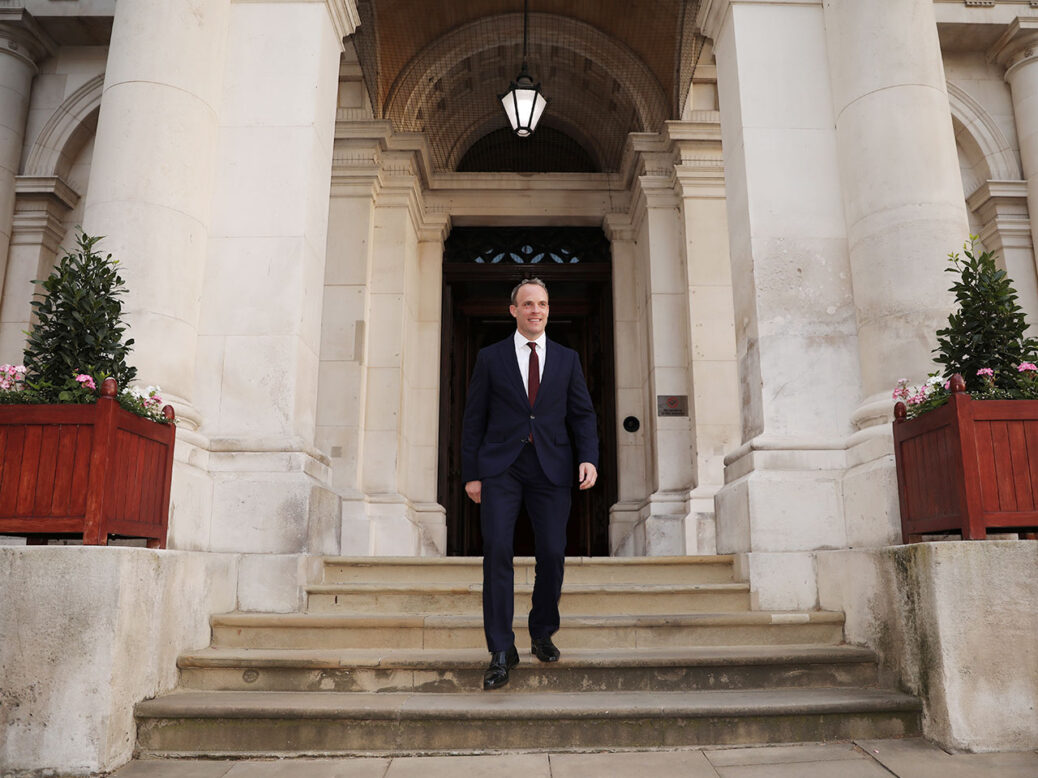
A contronym is a word that can hold two opposite meanings. For instance, cleave can mean to cling or hang on, as in cleave to outmoded ideas of conduct, or to separate, as in meat from the bone, or politician from ministerial post. Oversight can mean to pay close attention, say to numerous allegations of aggressive behaviour, or to overlook them. Sanction can mean to punish wrongdoing, or to permit it.
But these are mere binaries, where other words encompass a whole continuum of meaning. Consider, for example, “professional”, and the Deputy Prime Minister Dominic Raab’s consistent use of it as a dead-batted response to deny allegations against him of bullying and intimidating staff. “I behaved professionally at all times,” he has told us.
It’s a slippery notion, professionalism. It invites us to imagine a common standard of conduct that can be applied across the universe of gainful employment, yet the nature and demands of what each of us do to pay the bills is as various as human nature itself, from HR administrator to brand management consultant to florist to chicken farmer. To take an extreme yet everyday case, for bus drivers and other front-line workers during the pandemic, being professional meant exposing yourself to a deadly new illness while others stayed at home; for doctors, nurses and other NHS staff it meant the same plus attempting to save countless faltering lives amid perennial physical and mental exhaustion.
Let’s assume though, that for most of us white-collar, two-to-three-days-in-the-office drudges “professional” means something like the following. You get up in the morning and make yourself presentable and passably free of unpleasant odours. You are punctual, polite and discreet, honest and responsible. If you must eat at your desk, you do so with decorum and a minimum of noise. It means, within reason and subject to contract, putting the needs of the job ahead of your own immediate wants and impulses. It means doing your fair share and your best to rub along with all colleagues regardless of whether you much like them, or whether they much like you.
[See also: A reckoning for Dominic Raab, and Rishi Sunak]
Is this not a reasonable enough, and general enough, set of principles, something to which all of us could subscribe?
Not by any means. For there is another kind of professionalism, not much in fashion these days but still taken up by some great men who operate at life’s extremities – in military conflict, for example, or as one of the corporate org chart’s apex predators: the CEOs, the managing directors. We might call this paradox professionalism. Here, being professional means enacting the opposite of all the above in order to secure one’s status as the most professional professional of them all. The one who knows most, and works hardest and longest. It means not restraint and diffidence but unmediated emotional outpour: a pram-evacuating, foot-stomping, newspaper- or tomato-throwing expression of one’s id. It means management as a kind of rolling tantrum, but deployed only so that the mediocrities stationed below might in time be dragged up into your sphere of rarefied, punishing excellence.
It’s Ant Middleton and co from SAS: Who Dares Wins, beasting their hapless, hypothermic recruits – screaming in their faces and forcing to them throw themselves backwards out of helicopters and so on – to help them graduate into emotionally well-rounded killing machines. It’s Bodie from the landmark 1970s cop show The Professionals punching the bad guy first, asking the questions later, and then punching the bad guy again for good measure, strictly in the interests of justice and not because he liked punching people. It’s Paul Dacre, known for what we should describe as a “robust approach” during his long tenure as editor of the Daily Mail, declaring in 2004, pace John Lydon and Public Image Limited, that anger is an energy. “Shouting creates energy,” Dacre said. “Energy creates great headlines.”
It is only in this light that the possibility of the Deputy Prime Minister swaggering about in his ministerial pomp like Buckinghamshire’s answer to Judge Dredd makes some sense. Allies of Raab concede he is demanding, but insist that it falls well within the bounds of the acceptable. The Conservative MP Helen Grant said: “I witnessed a very decent, hard-working minister with high professional standards and a solid work ethic. Dominic has zero tolerance for bullying.” Others give a very different portrayal, of “cold anger” and a minister using “demeaning tactics to make himself the most powerful person in the room”.
Only Raab, those who worked with him, and maybe Adam Tolley KC know the truth of his conduct. But if history does ultimately judge him a bully, we should leave some space for the counter-narrative. That he was less a high-powered politician throwing his weight around among subordinates and more one of the last of that ancient and romantic breed: the maverick. He may not always have played by the rules, as others saw them, but, provided he wasn’t on holiday or called upon to comprehend the importance of the Dover-Calais crossing to the UK economy, he got results. And if that was so, then maybe those pen-pushers down at City Hall, or Whitehall, or Westminster, should themselves have acted professionally at all times, thought of the greater good, and resolved to lump it.
[See also: PMQs today: Sunak and Starmer slug it out on crime]





